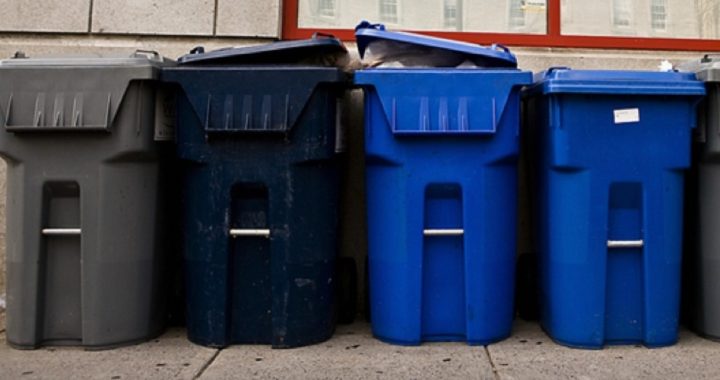
Many residents of Seattle, Washington, are outraged over a bill that grants city sanitation workers the right to inspect garbage and recycling bins and issue a $1 fine for “excess food waste.” The initial bill was passed in September 2014, and Seattle became the second U.S. metropolitan city to pass such an ordinance.
Represented by the California-based Pacific Legal Foundation, a group of citizens has filed a lawsuit against the city of Seattle, claiming it is violating people’s constitutional right to privacy. In the past, the Washington State Supreme Court has upheld laws requiring police to obtain search warrants in order to inspect people’s roadside garbage cans. However, the bill in Seattle grants that right to sanitation workers carte blanche.
Seattle Municipal Code sections 21.36.082 and 21.36.083 require that residents and businesses not put food scraps, compostable paper, yard waste, or recyclables in their garbage. Seattle Public Utilities gives warning notices for single-family garbage containers that contain significant amounts (more than 10 percent by volume) of recyclables or food waste.
Speaking to the Pacific Legal Foundation, Seattle resident Scott Shock said,
We don’t want a law that allows for sweeping surveillance of me and my neighbors. What’s next? Is it going to be collection of our data through smart meters…? This isn’t the Seattle that I chose to live in, and we need to first and foremost respect individual rights, including privacy rights.
In January, Seattle began flagging violators’ garbage cans with an initial “warning and educational” label. The educational period is set to last six months, after which fines will be levied beginning July 1, 2016. While the fine may be relatively small, as is highlighted in the lawsuit, the real matter at hand is the right to privacy. As Seattle attorney Ethan Blevins stated, “Seattle’s garbage inspection law violates the right to privacy and must be struck down.”
As The New American reported in this article, a similar privacy debate has taken center stage in Maryland’s Court of Special Appeals. Using devices known as “Stingrays” that vacuum up all data and information from all cellphones in a given area, police departments have been overstepping their boundaries in the collection and usage of such data.
Commenting on the issue, C. Mitchell Shaw of The New American stated,
Local police all over the country are using highly sophisticated, very expensive surveillance tools to capture information from cell tower traffic from the innocent and the guilty alike. The devices they use were originally touted as “tools for combating terrorism.” Now they are being used as the shortest path in solving even the most petty crimes.
A three-judge panel has ruled that police usage of the cell-site simulators has amounted to an illegal search. The ruling reads in part, “Cellphone users have an objectively reasonable expectation that their cellphones will not be used as real-time tracking devices, through the direct and active interference of law enforcement.”
Yet another example of governmental overreach lies with the FBI having been given direct access to vast amounts of data mined by the NSA. The New American magazine article entitled “FBI Harvests NSA Data Without Warrants; Promises to Make Secret Changes,” stated that it was found that throughout 2014 and 2015, the FBI was given direct access to all the data collected by the NSA from Internet usage.
The tendency for governmental bodies to take one step too far into the private lives of citizens is what lies at the heart of FBI usage of NSA data, the cell-site simulators, and the Seattle garbage inspection bill.
When the cell-site simulators were put to use for “anti-terrorism” purposes, they eventually ended up being used for all manner of unwarranted searches. Commenting on the food waste bill in Seattle, senior planning and development specialist Brett Stav insisted, “If people are trying to do the right thing and recycling and composting as much as they can, they shouldn’t have anything to worry about.” The statement in essence is saying, “Why do you care, if you’re not breaking the law?”
What the NSA, the FBI, and those who passed the Seattle garbage inspection bill miss is the Fourth Amendment to the U.S. Constitution which provides,
The right of the people to be secure in their persons, houses, papers, and effects, against unreasonable searches and seizures shall not be violated, and no warrant shall issue, but upon probable cause supported by oath or affirmation, and particularly describing the place to be searched, and the person or things to be seized.
To arbitrarily mine people’s cellphones, inspect their Internet habits, or dig through their curbside recycling bins ignores the Fourth Amendment and flagrantly skirts the law.
As the issue of government overreach continues to take center stage in a number of areas, there are states across the union that are attempting to curb federal laws that overstep their bounds. Last year The New American reported in this article about some of those attempts:
More than 200 bills have been introduced in state capitols across the country to nullify federal laws or regulations that the bills’ sponsors claim violate the Constitution of the United States.
“You have a choice,” Diane St. Onge, a Republican state representative in Kentucky, told The Hill. “To sit back and not do anything or say anything and let overregulation continue — or you have the alternative choice to speak up about it and say, ‘We know what you are doing or intend to do and we do not think that it is constitutional and we as a state are not going to stand for it.’ ”
If freedom is to be preserved, the U.S. Constitution must be preserved and followed — by the federal government when agencies such as the FBI are discovered riffling through our Internet sites, followed by local and state police departments when they are found to be mining our cellphones without warrants, and followed by city sanitation workers when they are told to inspect our garbage.
As Dori Monson of KIRO Radio in Seattle commented,
It’s insane that we’ve come to a time where government actually feels it has the right to go through people’s trash so that they can achieve some social objective with dubious benefits. I think it’s time to be a little bit fearful. I’m not the most paranoid person in the world, but we absolutely cannot allow the government to have that kind of impact on our lives.
Monson is correct. When a governmental body takes one step too far — as they have done with the ordinance which places sanitation workers in a position of judge and jury — the people must stand up for their rights.



